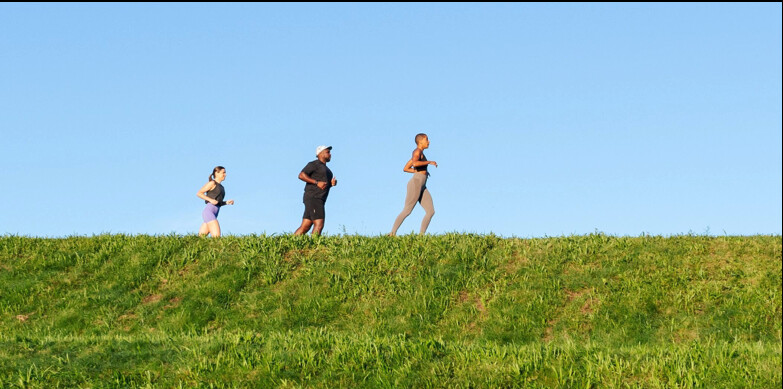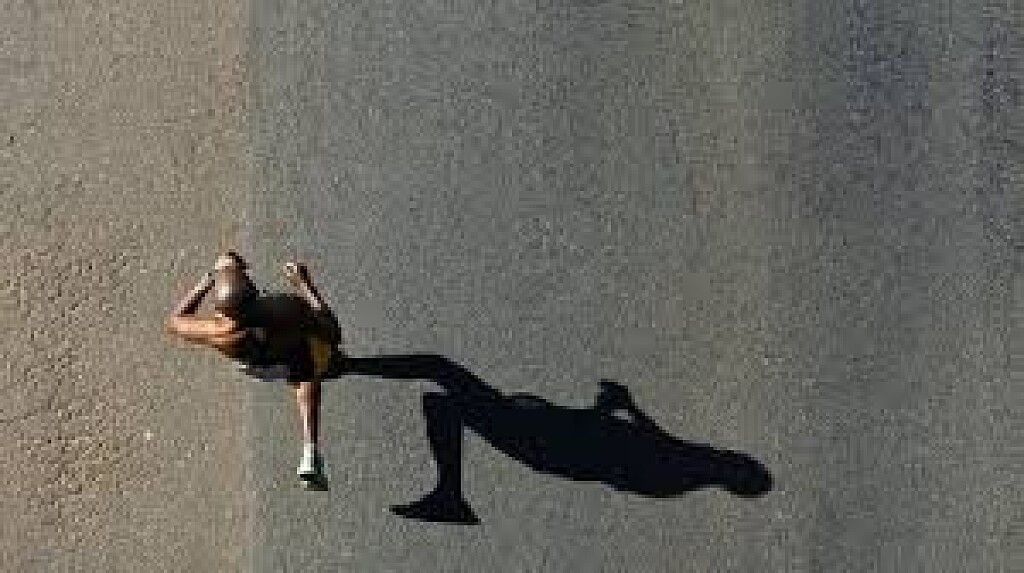Running News Daily
Running News Daily is edited by Bob Anderson. Send your news items to bob@mybestruns.com Advertising opportunities available. Train the Kenyan Way at KATA Kenya and Portugal owned and operated by Bob Anderson. Be sure to catch our movie A Long Run the movie KATA Running Camps and KATA Potato Farms - 31 now open in Kenya! https://kata.ke/
Index to Daily Posts · Sign Up For Updates · Run The World Feed
Does Running Make You Shorter? The Answer May Surprise You
Experts explain this physiological phenomenon.
Social media and online forums are full of tall tales, but this latest one had us scratching our heads: Some runners swear they’ve shrunk an inch or more because of their workout routine.

Is that claim bogus? Not entirely. Keep reading for the long and short of this quirky physiological question.
Does running make you shorter?
The short answer: Yes, it actually does. Fortunately, though, it’s only for a brief period of time. “It is true that people potentially can lose height when they run,” Todd McGrath, M.D., sports medicine physician at Hospital for Special Surgery in New York City tells Runner’s World. “Middle- and longer-distance runners can experience this, but it’s a slight difference and seems to be very transient.”
How slight? Think less than a centimeter, according to older research.
In the 1990s, researchers measured people before and after they ran six to 10 miles and established that they tended to lose 7 to 8 millimeters of height, Abigail Campbell, M.D., director of NYU Langone Orthopedics Center for Women’s Sports Medicine in NYC tells Runner’s World. “That effect was fairly similar between young and older patients; the older people actually lost less height, which is interesting,” she notes.
Why does running make you shorter?
The exact mechanism responsible for running making you shorter is still unknown, says McGrath, but it’s likely due to temporary volume loss in the intervertebral discs—the spongy, gummy-like pads between each of the vertebrae that make up your spine.
A temporary water loss in these discs was observed after running in several studies part of a new systematic review in the journal Sports Health mentions this phenomenon. “The short-term loss of running seems to be about 6 percent of disc height—though that doesn’t translate to 6 percent of your overall height,” he clarifies. “It’s a very small amount.”
“The bones aren’t changing as you run, but studies have found that the discs themselves can decrease about 3 millimeters total from the load of running,” says Campbell. That effect is most notable in the lumbar spine, a.k.a. your lower back.
Exactly what causes the diminished disc height is up for debate, says McGrath. “It could be compression sort of squeezing the discs or a fluid shift, we don’t really know,” he says. “There’s not great evidence into what the underlying mechanism is.”
What doctors do know: The shortening side effect is super temporary. “It’s been found to basically reverse after a night’s sleep,” says Campbell. The reprieve from gravity that lying down for seven or eight-ish hours is like R&R for your spine, giving the discs a chance to rehydrate and bounce back. That makes sense, notes Campbell: “I’ve been running for 25 years, and I’d be gone if I were truly losing every time I run.”
However, running does affect your height in another, more long-lasting way. “As we age, compression fractures of the vertebrae can happen, especially among older women,” notes Campbell. They aren’t always caused by trauma, such as pounding pavement, but by low bone density. These can cause the vertebrae to go from a nice square to flattened or a wedge—and that’s when people start to get a curved back,” Campbell explains.
Multiple micro compression fractures like these can ultimately decrease your height by possibly an inch or two over a lifetime. While running may have something to do with these injuries, it’s likely more your hormones and genetics. “I haven’t seen any data that unequivocally pairs [running and micro compressions] together. If anything, running should be protective because it does help with bone density throughout the whole body,” says Campbell.
How much do you have to run to get shorter?
This is another detail that’s a little up in the air. “We know the slight decrease in height happens in marathon runners,” says McGrath. But you don’t necessarily need to be pounding the pavement for hours at a time for the effects to be measurable. In fact, young runners lost around six percent of their intervertebral disc height after only 30 minutes of moderate-intensity running, according to a study published in Medicine & Science in Sports & Exercise in 2012.
But again, that’s temporary and in truth, being a longtime long-distance runner may actually be good for your intervertebral discs—and maybe your height—in the long run. Middle-aged endurance runners who averaged more than 50 kilometers per week for 10-plus years showed less age-related decline in their lumbar intervertebral discs than non-runners in a PLoS One study published in 2020. On average, the runners had 20 percent greater disc height than others.
What other activities can cause disc-related changes in your height?
In general, people lose a slight amount of disc height every day whether they’re runners or not, McGrath and Campbell agree. The effect can be more prominent for those who are on their feet a lot throughout the day, adds McGrath, noting that “most people are tallest first thing in the morning.”
Besides running, other sports can have a similar temporary shortening effect. Researchers have also looked at swimming, weight-training, soccer, basketball, says Campbell. “Heavy weight training, running, and basketball were similar, with significantly decreased heights noted after each sport,” probably due to the load-bearing nature of them, she says. “The others didn’t have much of an effect.”
So, should you be concerned about running making you shorter?
In short, no. Running has a ton of great physical benefits, from burning fat and boosting your heart health to improving bone density. This side effect of running isn’t really a negative issue, just a weird thing that happens in our body, says McGrath. “The concerning thing for some people may be whether they’re going to get shorter over the long run from running, and the answer is no.”
You don’t need to hang from a pull-up bar or stretch like crazy to counteract the effect. But strength training or exercise that targets your core in particular is a good, proactive step, say McGrath and Campbell. “Runners tend to focus on running and not always core strength, but strengthening the back and the core is really important to prevent a lot of running-related injuries,” says McGrath. “In general, it’s great for injury prevention, back health, and overall health, too.”
by Runner’s World
Login to leave a comment




